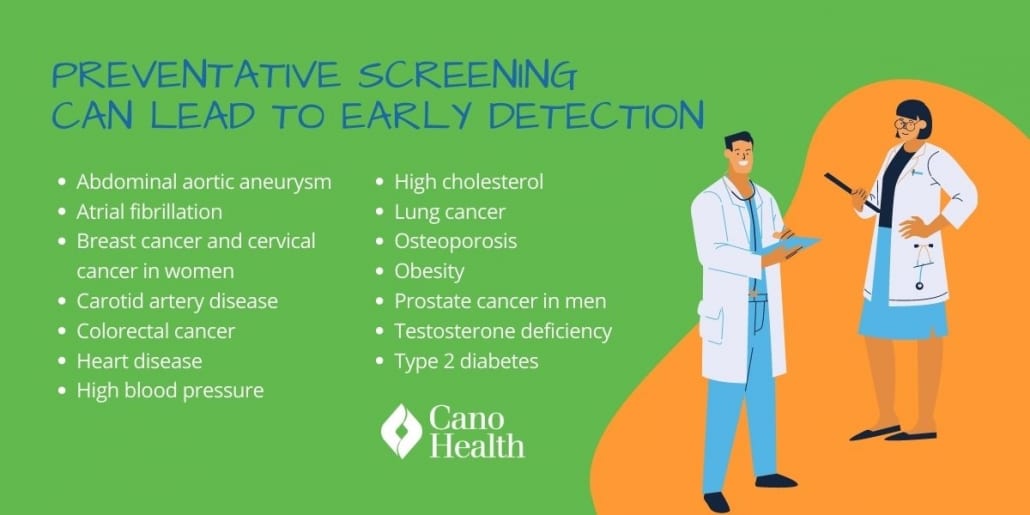Preventive Health Screening: What to Know
Many seniors know the importance of maintaining a healthy lifestyle to stay well and to manage the issues one experiences with aging. Many are doing this maintenance on their own – staying active by gardening or taking walks, staying happy by being around friends and loved ones, and eating healthy diets to manage health issues such as diabetes or high cholesterol. All of these actions are vital for seniors who continue to live their best lives.
What many seniors may not know, however, is that preventive health screening is another important part of maintaining a healthy lifestyle. So what is preventive health screening? There are many health screening services available to seniors. These screening services aim to look for diseases before there are any symptoms in a patient by testing for those diseases.
Many conditions that are dangerous to a senior’s health and wellbeing can be silent in that they show no early warning signs. You may feel absolutely fine, but tests could reveal the presence of a disease. Preventive health screening is an effective and easy way to learn about potential health problems and risks so that you can take the necessary steps to communicate and work with your doctor and ultimately prevent chronic illnesses that might otherwise have been caught too late to treat effectively.
Here are some of the conditions that seniors are commonly afflicted with that health screening services can detect early on:
- Abdominal aortic aneurysm
- Atrial fibrillation
- Breast cancer and cervical cancer in women
- Carotid artery disease
- Colorectal cancer
- Heart disease
- High blood pressure
- High cholesterol
- Lung cancer
- Osteoporosis
- Obesity
- Prostate cancer in men
- Testosterone deficiency
- Type 2 diabetes

Health screening services are very important for your health. They are also cost-effective for the health care system overall and are so much less invasive for the individual. You may be someone who is at high risk for a particular condition. Many factors contribute to a person being at high risk for chronic conditions. For example lifestyle, family history, and environmental factors are all significant players in determining whether a disease is likely.
For many chronic diseases, there may be no early warning signs. You may not feel ill or abnormal in any way. Preventive health screenings are there to test regardless of symptoms. For example, if your doctor determines you are at high risk for heart disease due to a variety of factors that may or may not include symptoms you are experiencing, you would be tested and have the opportunity to detect any problems early on.
The process of preventive health screening means proactively managing your health and staying on top – or ahead of – illness rather than catching up to treat symptoms that are wreaking havoc on your health. Preventive screenings have saved many lives and as previously mentioned they are cost-effective and noninvasive. A prime example of this is stroke victims. Strokes are known as silent killers. They often have no symptoms patients can be aware of. However, health screening services could include a carotid artery screening which would help doctors identify their patient’s risk of suffering from a stroke. Hopefully, these examples show the importance of early detection in treating illness and disease and preventive health screening.
After reading this you will likely understand the importance of preventive health screening. Perhaps you will speak to the staff at your senior medical center to decide which screening could be helpful and potentially life-saving to you. Here are some questions to ask yourself when scheduling preventive health screens:
- What tests do I need? – Determining the type of screening you need will depend on your particular risk factors. Your doctor can help you make this decision.
- Have I spoken to my family? – Many people can determine risk based on a comprehensive family medical history.
- How much does screening cost, and will my insurance cover it? – More and more insurance companies and health care facilities are seeing the benefits of preventive health screening and covering these services for patients if they are deemed necessary or relevant based on your risk level.
- What do I need to do to prepare for the screening? – Be sure you have followed your doctor’s orders. For example, some screenings may require you to fast for 12 hours in advance. Be sure to know what is expected of you.
- What does the preventive health screening involve? – Fully informed patients who are active in their care have an easier time navigating the healthcare system overall. If you can have an advocate or loved one step in to help you manage all of the information that can be a great help.
- Are there any side effects that could result from the testing? – Again, it is important to be a fully informed patient. Will the test take long, will you need time to recover, will you feel sick? These are all important questions to ask in advance.
- How will I find out the results of my test? – Doctors will confidentially provide your results as always. You should know how long the results take and when you can expect to hear back about your results.
- What will I know after the test? – Just testing is not enough. It is vital to act on the information you receive from testing. You may know more about your risk for disease or you may know you have the disease. Manage your expectations by talking with your doctor throughout the process.
- Am I comfortable with getting results that I may need to act on? – Are you ready to engage in further health care after your screening if necessary? Surgery? Diet change? Medications? There are many ways that you as the patient will have to adjust your life to manage risk for disease or the presence of disease in your life.
For help in answering these questions, and to find out which preventive health screening services you would benefit most from, contact Cano Health today.



